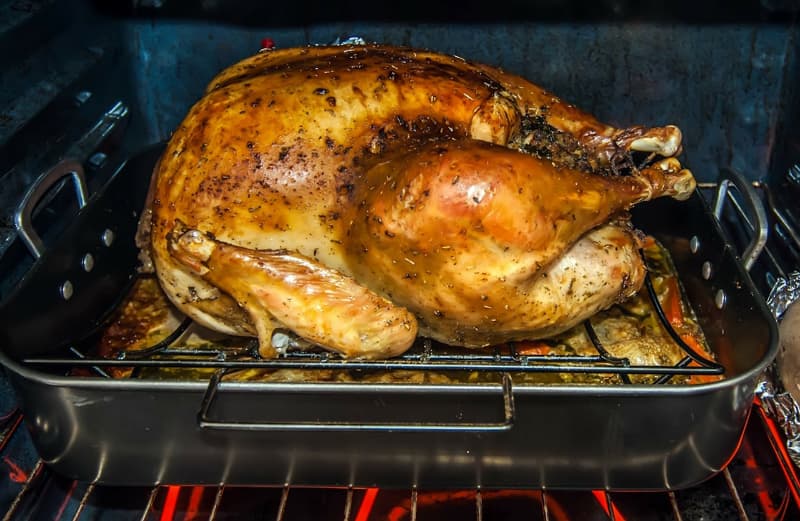Turkey season is now in full swing, and turkey cooking tips are popping up everywhere. This article will help you make the best turkey possible by giving you turkey baking tips, turkey prep tips, roast turkey tips, cooking time for a turkey, what not to do when roasting a turkey, and helpful hints that will produce the best tasting bird.
What should I look for when buying a turkey?
When you’re looking to buy a turkey, some things typically come up.
- You want a fresh turkey, and if so, then the turkey needs to be natural or free-range, or heritage turkeys as those labels mean no antibiotics have been added.
- If it has an Amish label on it, then you know it’s fresh.
- Kosher turkeys are also fresh and typically free of antibiotics.
- A frozen turkey can be purchased for weeks beforehand, which is fantastic if you have space in your freezer for a turkey.
- Fresh turkeys are often available weeks ahead of the holiday, but you should check to make sure they haven’t been injected with water or other liquid that will cause them to lose flavor and moisture during cooking.
- If the turkey is self-basted, there will be a butter flavoring or oil and water injected inside the turkey.
How much turkey should I buy? Is it less or more than a pound per person?
Typically looking at about one and a half pounds per person, which means if you had ten guests, you would need about 15 pounds of turkey.
How to Prepare Frozen Turkey Meat?
A frozen turkey needs at least 24 hours of thawing time in the refrigerator, but if you’re pressed for time, use cold water with a turkey bag.
How do I prepare a turkey that has not been previously frozen or refrigerated?
Rinse the bird inside and out, then use a paper towel to dry it completely. Make sure there are no feathers left on the turkey, but if you do happen to have a few remaining, take care of them by plucking the feather shafts or using poultry shears to clip them off at their base.
At this time, you can also remove the neck and giblets from the turkey’s main cavity if you so choose. You may utilize the giblets and the neck later to stuff beneath the turkey during cooking since the neck has a lot of collagen and is delicious.
Prepping your turkey is very important to get a perfect turkey every time!
- When prepping their turkey for cooking, the most common mistake is not thoroughly drying it with paper towels before seasoning or marinating it. Allowing water to come into contact with turkey meat will result in a turkey that is too moist, which can cause it to be less flavorful.
- Another common mistake is not allowing time for the turkey to come up closer to room temperature before cooking.
How to season turkey?
Turkey cooking tip that seems to confuse many people is how much seasoning should be used on a turkey. It’s actually quite simple, kosher salt and pepper maybe garlic powder are the only seasonings required as turkey meat already has abundant flavor.
If you want to add some additional flavors such as thyme or rosemary, then simply sprinkle them over the turkey and under the turkey skin, and if you’d like to add some additional salt and pepper, then feel free to do so.
Get ready for the bird stuffing, add more flavor!
Fill the cavity with whatever you want, whether fruit or vegetables. All of these ingredients will cookout, resulting in a richer flavor to the turkey. It’ll add bulk to the turkey cavity and provide it some great taste.
- Veggies: onion, garlic cloves, celery stalks, carrots
- Fruits: citrus lemons, limes oranges, green apples
Be careful overstuffing the cavity, it has the undesirable side effect of preventing natural airflow from entering the bird and delaying your cooking time.
How do properly marinate a turkey?
If you want a more interesting turkey flavor or are marinating your turkey overnight before cooking it, try using yogurt instead of water or olive oil as a base for your mixture. Yogurt adds a lightness that will not overpower the turkey but still helps to keep it moist.
There are a few turkey cooking tips for marinating turkey that you should remember.
- First, it is important to make sure your turkey is completely thawed before adding any type of mixture to the turkey meat itself.
- Another turkey cooking tip is to marinate your turkey overnight, this will ensure that every part of your turkey meat has a chance to absorb some of the turkey marinades.
- Finally, don’t forget to clean the turkey before cooking it! Some sections of the turkey marinade may be too salty and overcook or burn if you don’t get rid of all of it before roasting.
- When you’re ready to cook the turkey, don’t start cooking for at least another hour after it’s been cleaned and dried. This will allow you to achieve a turkey skin that is much crispier in the end.
Another great technique is to soak the whole turkey in a brine solution
Make a brine of one cup bbq rub and apple juice to soak the bird for 48 hours, then rinse the skin off and set it on a rack so that it can drip dry. Don’t forget to let it rest before the season as mentioned above if you want crispier skin.
How to cook turkey?
- So the first thing you need to do to assure the greatest succulent roasted turkey is to remove the turkey from the refrigerator at least 2 and a half hours before cooking.
- Use a roasting pan, start with three or four medium-sized onions cut them in half, along with three garlic cloves. They’ll go beautifully sweet and golden as they roast beneath the bird. Some celery, some carrots, a bit of rosemary, and bay leaves. Add several bays leaves to the mix. Add the giblets and the neck too!
- You’ll need about half a pound of butter, and most will drain away during the cooking process. So just rub it on; there’s no such thing as good manners when it comes to seasoning your turkey. Alternatively, you can use olive oil.
- Then, drizzle it with enough sea salt to give it a salty flavor.
- Add some freshly ground black pepper and garlic powder.
- Be careful overstuffing the cavity has the undesirable side effect of preventing natural airflow from entering the bird and delaying your cooking time.
- A meat thermometer is helpful, and it can be inserted into the thickest area of the turkey. (turkey breast)
- Place the turkey breast side up on a roasting pan.
- Cover it loosely with a thin layer of foil for about an hour to keep the skin moisturized. This will really help to contain juiciness while also protecting the skin.
- Preheat the oven to 350° degrees Fahrenheit.
- Place turkey in preheated oven loosely covered with aluminum foil for about an hour.
- Calculating the roasting time at 15 minutes per pound If the turkey is covered or placed in an oven cooking bag, the cooking time will vary.
- Get that bird in the oven at 350° Fahrenheit, which is 180° degrees celsius.
- Remove the aluminum foil halfway through the cooking and, using a little spoonful of juice under the bird, just coat the turkey with all of those wonderful cooking juices, put the foil back.
- Remove the foil and raise the temperature to 400° F, crisp the skin up about half an hour before the end of its cooking time.
- When the thickest part of the breast reaches 170° F, you’re done. Check it for doneness with an instant-read thermometer in a few thick sections, if you do not feel any resistance, it is also a telltale sign that the turkey is fully cooked.
- Once you have finished, let the turkey rest for at least one hour.
Final thoughts
Guys, turkey is great. I think it’s best to go with turkey in the oven when you want a special meal for everyone because turkey has so many different flavors and textures that can be combined together. Be creative! It will turn out delicious every time. If you’re feeling adventurous, try making your own marinades and glazes.
I hope it turns out well, turkey is one of the best meals you can make for your family and friends. Happy cooking!
Check out our guide for the greatest goat cheese substitute ideas.
Last updated: September 24, 2023


